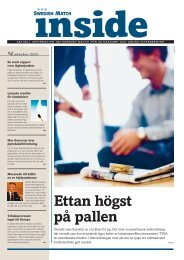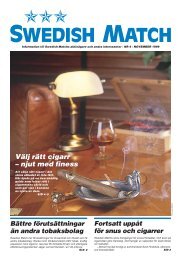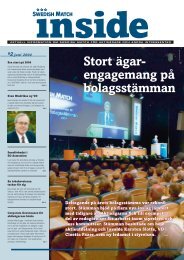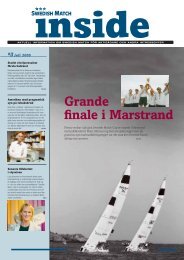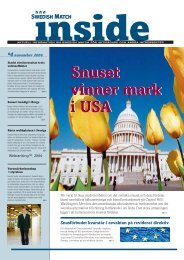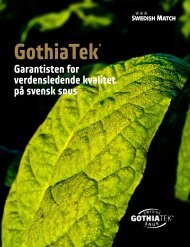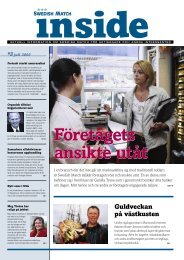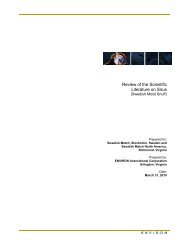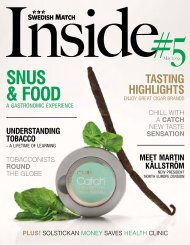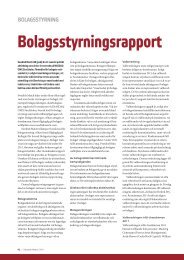You also want an ePaper? Increase the reach of your titles
YUMPU automatically turns print PDFs into web optimized ePapers that Google loves.
10 A MAGAZINE FOR SWEDISH MATCH’ S SHAREHOLDERS AND OTHER INTERESTED PARTIES NO 1 · FEBRUARY <strong>2000</strong><br />
ACQUISITION OF LEONARD DINGLER IN SOUTH AFRIKA<br />
High expectations<br />
of social reforms<br />
The social reforms that are expected to characterize<br />
South African business during the next few years will<br />
also be of crucial importance for the operations of<br />
Leonard Dingler Ltd. The Employment Equity Act of<br />
1998 stipulates that companies have only five years<br />
to create a better balance in the work force, concerning<br />
gender, race or impairment.<br />
Simon Malekutu (center)<br />
is Leonard Dingler<br />
Ltd’s only black foreman.<br />
He is in charge<br />
of distribution for the<br />
entire company.<br />
”I hope the change of<br />
ownership will increase<br />
Leonard Dingler’s<br />
growth potential so<br />
that we can create more<br />
job opportunities,”<br />
says Simon.<br />
Foreman Apie Putter<br />
discusses tobacco<br />
quality with plant manager<br />
André Oosthuizen.<br />
About half of the<br />
tobacco used at the<br />
plant comes from<br />
South Africa; the<br />
remainder is from<br />
South America.<br />
The responsibility for ensuring that this<br />
occurs rests with corporate managements.<br />
Negotiations with the unions are currently<br />
under way at Leonard Dingler to prepare the<br />
action plan required by the government, which<br />
is intended to show that companies are<br />
working actively to fulfill the equal-rights<br />
requirements laid down in the legislation.<br />
“<strong>No</strong>w people are impatient to see results.<br />
They expect greater openness, a better work<br />
environment and improved development<br />
opportunities,” notes newly appointed human<br />
resources manager David Masina.<br />
He is the first non-white in corporate<br />
management, and is fully aware that high<br />
expectations are also riding on him.<br />
“Under the terms of the Act, we must ensure<br />
Personnel manager David Masina (left) and company president Mark Wraith have a number of problems<br />
to resolve before they will be able to satisfy government demands for greater equality in the<br />
workplace. The aim is that the composition of the workforce should reflect that of the country’s<br />
population. This means, for example, more women on the factory floor and more black supervisors.<br />
that our workforce reflects the composition of<br />
the population in South Africa,” explains Masina.<br />
“In our case, for example, we must take<br />
steps to employ more women in production and<br />
appoint more colored people as supervisors.”<br />
Discussions are also under way regarding<br />
other changes, such as clearer career-advancement<br />
paths and descriptions of responsibilities,<br />
as well as common benefit systems.<br />
David Masina predicts that the next few<br />
years will be a period of upheaval for everyone<br />
in South Africa, but he takes a positive view of<br />
developments.<br />
“Most people I know, regardless of their<br />
skin color, have accepted the inevitability of<br />
social change,” he says.<br />
Language skills<br />
important for job<br />
Leonard Dingler’s products are sold throughout<br />
South Africa and in the neighboring countries.<br />
Simon Malekutu, who has worked for the company<br />
for 18 years, is in charge of distribution.<br />
I<br />
like my job,” says Simon. “Always<br />
plenty to do and lots of<br />
contacts with customers.”<br />
He takes a highly positive view<br />
of the change of owner.<br />
“I hope to see the company<br />
grow, so that we can create more<br />
job opportunities in due course.<br />
There is an urgent need for jobs in<br />
South Africa.”<br />
<strong>No</strong>where else in Africa is there<br />
such a complex population mix as<br />
in South Africa. Blacks, whites,<br />
coloreds and Asians are the largest<br />
groups, and each of these groups<br />
can be divided into a number of<br />
subgroups. Blacks represent the<br />
bulk of the population and whites<br />
are the second largest population<br />
group. It is quite usual for a South<br />
African to speak several different<br />
languages on a daily basis. Simon<br />
Malekutu is fluent in eight languages:<br />
English, Afrikaans, <strong>No</strong>rth<br />
Sotho, Zulu, Xhosa, Venda, Tswana<br />
and Swazi.<br />
“I need all these languages to<br />
be able to communicate with my<br />
colleagues,” he explains.<br />
Simon’s white colleagues, and<br />
immediate superiors, plant manager<br />
André Oosthuizen and his<br />
assistant Deon Putter also benefit<br />
from knowing several languages.<br />
They spend their working days on<br />
the factory floor and have their<br />
office in the heart of the plant.<br />
“We apply an open-door policy,”<br />
says André. “All employees<br />
are welcome to drop in and discuss<br />
whatever is on their minds,<br />
regardless of whether it concerns<br />
the job or their private life.”<br />
André Oosthuizen’s responsibilities<br />
include the purchase of<br />
tobacco, as well as production and<br />
product quality in the factory.<br />
“Hardly anyone quits their job here,”<br />
says Deon Putter, deputy<br />
plant manager, whose father also<br />
works at the plant.



